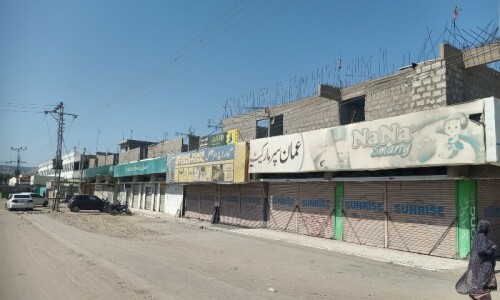THE official visit by Iranian President Ebrahim Raisi, which ends today, has been marked by mutual praise, and promises to improve ties, particularly in the economic sphere.
The significance of the trip has been enhanced by the prevailing geopolitical tensions in the region, particularly Iran’s conflict with Israel, poor ties between Tehran and the Western states, especially over the former’s central role in the ‘axis of resistance’, as well as the unpleasant episode in January when Iran and Pakistan exchanged missile strikes.
Thankfully, whatever bitterness was engendered by the latter incident seems to have been forgotten, as Pakistan rolled out the red carpet for the Iranian leader. In Islamabad, Mr Raisi met the president, prime minister and army chief, and later headed to Lahore and Karachi to meet the respective provincial leaderships.
Trade topped the Iranian president’s agenda, while security issues were also discussed. Mr Raisi said the current level of bilateral trade was “unacceptable”, and desired to see annual trade go up to $10bn. Foreign sanctions, as well as the lack of proper banking channels, stand as major obstacles in enhancing bilateral commerce. Expanding the number of border markets can help remove these obstacles, and bring socioeconomic opportunities to border communities on both sides.
Pakistan also seeks to expand foreign trade to improve its economic position. While searching for trade partners across the oceans should continue, we must work to expand regional commerce. As things stand, South Asia is among the world’s least integrated regions. While resuming economic ties with India is more complicated, Pakistan should strive to improve trade relations with its western neighbours, Iran and Afghanistan. This can open pathways for Pakistani products to markets in Central Asia and greater Eurasia.
Regarding security matters, violent non-state actors operating in the common border areas present challenges to both states’ security. Therefore, it is welcome that an accord was signed on security cooperation. Both countries’ security forces should cooperate with each other to neutralise malign actors and manage border security.
As for the Iran-Pakistan gas pipeline, the issue was obliquely referred to in a Pakistani statement, but there has been no major breakthrough. Mr Raisi mentioned that some actors did not want to see Pakistan-Iran relations grow. “It is not important,” he said, dismissing critics. The US, meanwhile, has again cautioned that anyone doing business with Iran risks being sanctioned by America.
Pakistan must take a long-term view of this problem. While ties with the US are important, should Pakistan seek American approval for all key economic and strategic decisions? Today, the US does not want the Iran pipeline to proceed. Tomorrow, if ties between Washington and Beijing nosedive, and the US asks Pakistan to reconsider CPEC, or our defence cooperation with China, will we comply?
Published in Dawn, April 24th, 2024














































